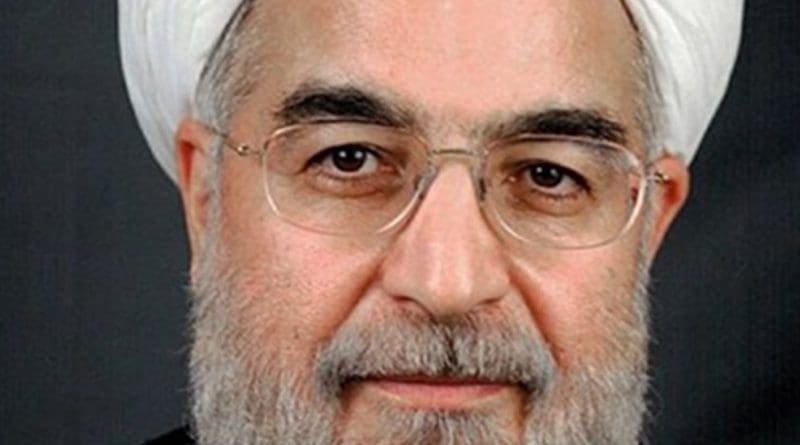Rohani Says End Results Of Iran Nuclear Talks A ‘Win-Win’
By Iran Review
Iranian President Hassan Rohani says the achievement of his administration in resolving the nuclear issue has been beyond initial expectations.
President Rohani said he did not mean to exaggerate, but believed that what was achieved at the end of the negotiations between Iran and the P5+1 group of countries was beyond what was initially expected.
President Rohani said that the end results of the negotiations were a win-win. He said the opposite side had said it was pursuing an objective of preventing Iran from obtaining a nuclear weapon. Iran never intended to build atomic bombs, the president said; so, ‘if the other side in the negotiations thinks it has achieved that goal of preventing an Iranian bomb, let this be a victory for it.’
The Islamic Republic, however, had three goals in the talks, all of which were achieved, President Rohani said.
The Iranian president said the fact that an interim agreement between Iran and the P5+1 has stood over the past nearly two years could be a sign that the comprehensive agreement reached between the two sides on July 14 could also be assumed as capable of standing.
We cannot say we have 100% trust in the partners to the agreement, but we can devise a mechanism under which no side would face a loss if the other breached the agreement, the president said.
He said Iran has never sought weapons of mass destruction.
It did not opt for the manufacturing of such weapons even when it faced an Iraqi war back in the 1980s, the president said.
“Iranian people are noble; even when fighting, they fight nobly, they don’t seek weapons of mass destruction,” he said.
Referring to certain concerns about inspections under the JCPOA, the president said there is no reason to worry at all as what Iran has agreed to under the JCPOA is nothing extraordinary.
“No one in the world would trade its national security… and its secrets,” he said, reassuring that Iran’s military capabilities will by no means be depleted.
Regarding the economic impacts of the anti-Iran sanctions that his administration sought to have removed as a result of the agreement, President Rohani said his cabinet has been successful in containing or countering such economic woes as a high inflation rate and stagflation.
“Sanctions cannot be successful, ever; but they can have impacts,” he said, adding that as a result of the success of the negotiations, the doors of international business opened to Iran.
No country can be found that is not happy about the conclusion of the agreement between Iran and the P5+1, but a handful of warmongers and Zionists, President Rohani said.
About concerns that potential increased trade activity as a result of the removal of the sanctions against Iran would result in imports of foreign goods to the country, President Rouhani said such concerns are valid.
He said Iran would welcome foreign investment, but not increased imports. The Iranian president said he has directed his economic men about the issue.
Iran should work hard toward employment for the youth, the Iranian president said.
He said, by the end of his administration’s term in office, the inflation rate in the country will be down to a single-digit figure.
Regarding the potential acts of mischief by the International Atomic Energy Agency (IAEA), the UN agency that has been tasked with carrying out the technical specifications of the JCPOA. President Rouhani said the country should be very vigilant that such mischief does not occur, both in terms of security issues as well as technicalities.
The Iranian president also said that the impacts of the removal of sanctions under the JCPOA will not be felt overnight.
He said the “sapling” that has been planted will take some time to bear fruits, emphasizing, however, that his administration will try to have such impacts come sooner.
Iran’s foreign minister has also warned against efforts likely to cause destabilization throughout the Middle East, saying such instability would affect all countries in the region.
“Iran’s priority has, from the beginning, been having good and strong relations with its neighbors,” Mohammad Javad Zarif said.
Iran cannot remain indifferent towards the profound destruction around it, he stated, adding, “Experience tells us that instability and unrest know no boundaries.”
Citing a case in point, the senior Iranian diplomat said extremist and violent groups such as the ISIL cannot be rooted out in Iraq while they are effectively expanding in Yemen and Syria.
Zarif reiterated Iran’s proposed four-point plan for the resolution of the crisis in Yemen, which calls for an immediate ceasefire, delivery of humanitarian aid to Yemeni civilians, facilitation of dialogue among the groups inside the country, and finally creation of a broad-based national unity government.
“A similar plan was proposed two years ago by the Islamic Republic following consultation with some neighbors and other regional actors for the restoration of peace and stability to Syria,” he said.
Zarif also hailed the conclusion in the Austrian capital Vienna last month of marathon nuclear negotiations between Iran and the P5+1 group of countries — the United States, Britain, France, China, Russia and Germany.
The development, he said, “was a necessary start for the region, and not only is not against the interests of any of our neighbors, but is an achievement for the entire region as it ended an unnecessary and 12-year-long tension, which threatened our region more than anywhere else.”

